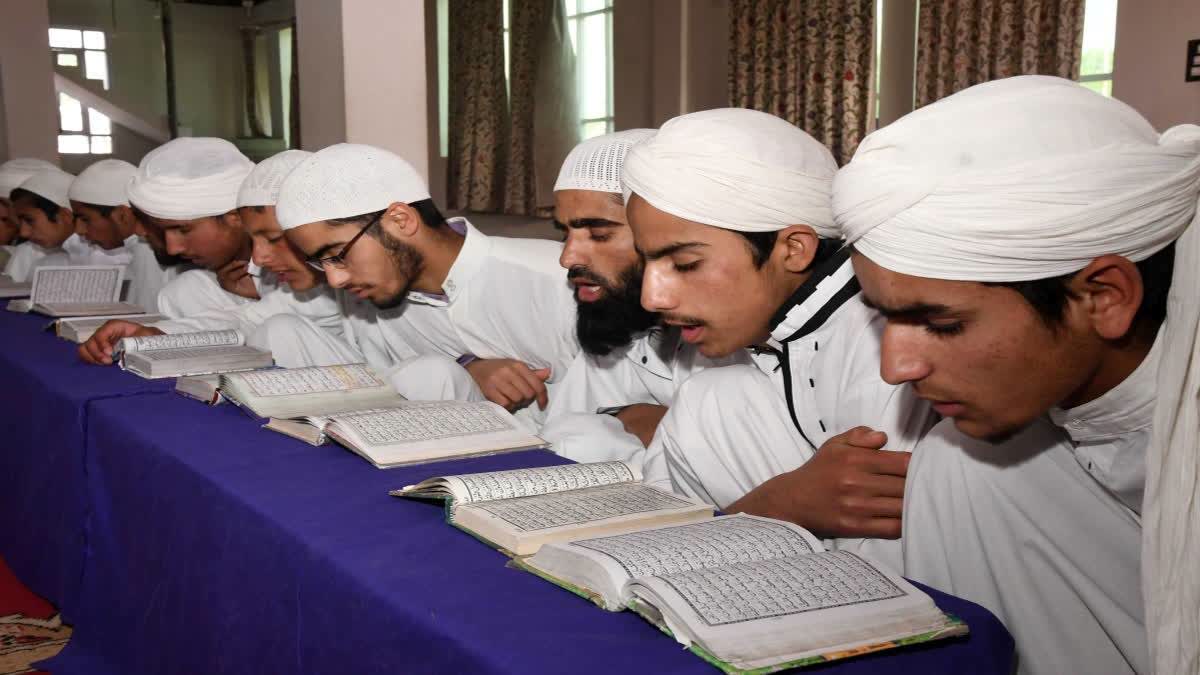New Delhi: The National Commission for Protection of Child Rights (NCPCR) has told the Supreme Court that Madrassa is an unfit place to receive ‘proper’ education and it works arbitrarily and runs in an overall violation of the constitutional mandate, Right to Education Act and the Juvenile Justice Act, 2015.
The NCPCR, in its written submissions, said the Board of Madrasa Education should not be regarded as an academic authority because it is merely a body with the power to conduct examinations, and the examinations administered by the board are completely at odds with the curriculum of NCERT and SCERT, keeping the students of Madrassas behind those who fall within the purview of RTE.
The commission said that to impart instruction that is entirely in the context of religion is a flagrant violation of a child’s fundamental right to education which does not adhere to the requirements of the RTE Act, 2009, or any other applicable laws. Innocent children suffer as a result of the religious subject getting institutionalised in Madrasas, it added.
“A Madrassa is not only an unsuitable/unfit place to receive ‘proper’ education but also in the absence of entitlements as provided under Sections 19, 21,22, 23, 24, 25, and 29 of the RTE Act. Further, Madrassas do not only render an unsatisfactory and insufficient model for education but also have an arbitrary mode of working devoid of a standardised curriculum and functioning,” it said.
The written submission was filed by the commission in a matter related to Madrassas in Uttar Pradesh. On April 5, the apex court put on hold the Allahabad High Court’s March 5 order striking down provisions of the Uttar Pradesh Board of Madarsa Education Act, 2004.
The apex court had said it was of prima facie view that the law does not provide religious instruction and students are also imparted education in secular subjects like science, mathematics and social studies.
The commission said, on perusal of the list of books available on the website of the Madrasa Board, it has found objectionable content in Diniyat books being included in their curriculum. It has been observed that as per the prescribed curriculum, the Madrassa Board is teaching texts through these books that profess the supremacy of Islam.
In its written submission, the NCPCR mentions that even though the Darul Uloom Deoband Madrasa was founded in Deoband in Saharanpur district of Uttar Prades, it has been impacting the people professing Islamic culture and practices across the country and abroad.
The commission said it received complaints regarding the fatwas issued by Darul Uloom Deoband which contained references from a book titled ‘Bahishti Zewar’.
“It is pertinent to mention here that the said book has content which is not only improper but also objectionable and illegal for children as the same contains text on engaging in a sexual relationship with a minor. The book is also alleged to be taught to children in madrassas, and further fatwas containing such objectionable information accessible to all”, it added.
The NCPCR said it has come across various objectionable content on the website of Darul Uloom Deoband wherein one of the fatwas was issued regarding establishment of physical relationship with a minor girl which is not only misleading but also in violation of the provisions under POCSO Act, 2012.
The commission said another fatwa was issued on the Darul Uloom Deoband portal where a question was asked by an individual from Pakistan regarding suicide attack on non-Muslims forces and a statement of “consult your local scholar” by the Darul Uloom Deoband instead of responding to the query is invalid or illegal.
“Such statements by Darul Uloom Deoband are reinforcing the belief towards legitimizing intentional homicide, terrorist attack among non-Muslims and is a matter of national security”, it said.
The commission said a school is defined under Section 2(n) of the RTE Act, 2009, which means any recognised school imparting elementary education and a Madrassa being out of this definition has no right to compel the children or their families to receive education at Madrassa.
The commission said lack of proper curriculum, teacher eligibility, non-transparency/funding, and violations of the law of the land, Madrassas also failed to provide a holistic learning environment to the children.
The child rights body said the Madrassas are getting Unified District Information System for Education (UDISE) Codes despite not fulfilling the required norms and standards as per the RTE Act, 2009.
“The fact of children getting education in government-funded Madrassaa including the unmapped madrassas which are receiving funds from the state governments is a clear violation of the law of land and such an education which is devoid of the basic curriculum, eligibility and holistic environment cannot be furthered on the expenses of the State”, it said.
The commission said though the Madrassas are running across the country, only states like Bihar, Chhattisgarh, Odisha, Uttar Pradesh, West Bengal, Madhya Pradesh, Rajasthan and Uttarakhand have Madrassa Board.
Read More:



